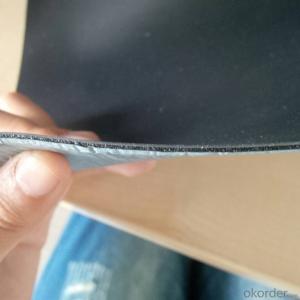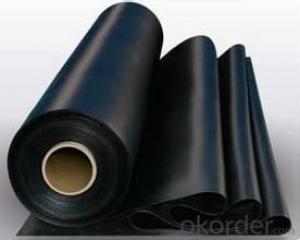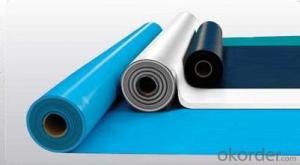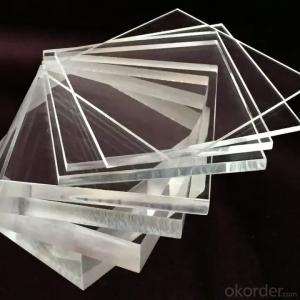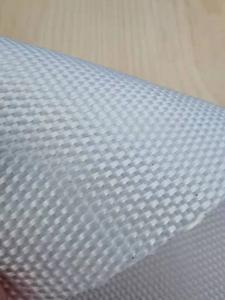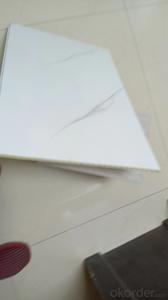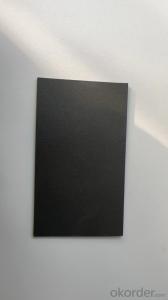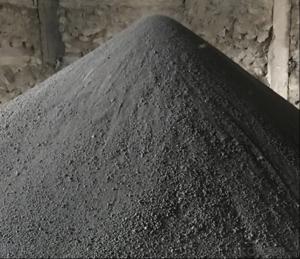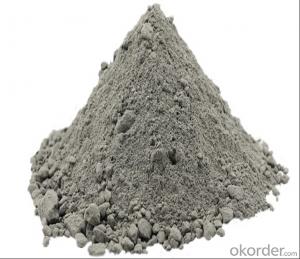SBS Modified Waterproof Membrance
- Loading Port:
- Tianjin
- Payment Terms:
- TT or LC
- Min Order Qty:
- 10000 m²
- Supply Capability:
- 15000000 m²/month
OKorder Service Pledge
OKorder Financial Service
You Might Also Like
Quick Details
Type: | Waterproof Membrane, Waterproof membrane | Place of Origin: | China (Mainland) | Brand Name: | CMAX |
Model Number: | ASTM | Model number: | SBS | Usage: | subway cold storage airport runway and viaduct |
Thickness: | 2-5mm | Heat Resistance: | 105 degree | Surface: | PE,S,M |
Weight: | 31.5-50kg/roll | Solubles: | 2900 g/square meter | Standard: | GB18242-2000 |
Tensile Strength: | 450N/50mm |
Packaging & Delivery
Packaging Details: | packed in rolls with pallets |
Delivery Detail: | within 10 days after receipt downpayment |
Product Characteristics
Good capacity of anti-aging, anti-acid, and anti-alkali, its service life is 30years.
High tensile strength and elongation which adapts to the contraction or crack of the base.
Good perdurable capacity to climate; be used in cold(-25°C)environment for long life.
Applied by torch.
Widely applied in roofing, basement, pool, subway etc.
Construction Requirements Basement Treatment
The waterproofing base should be strong smooth, and clean without particles on the surface. No peeling or cracking shall exist on the surface. The corners of the base shall be made into arcs with a radius of no less than 20mm or triangular. The drain slope, division seam, and air vent shall be carried out and treated according to design requirements. Then brush promer on the foundation until it is dry.
Installation
Place the sheet correctly, fire torch, evenly heat the sheet and foundation ,When the surface of the sheet is black and bright with a fusion layer apply the sheet and press it into a solid and flat state. Before the sheet is cool, seal the edge of joints by float.
Cautions installation is forbidden during rain, snow, fog, strong wind.
The temperature should be 5-35°C during installation.
All nodes should be reinforced during installation.
Keep away from fire during storage.
Package transportation and storage
The product is packed by plastic bag or adhesive tape.
Thickness:2-4mm width:1.0mm length:7.5mm 10mm
During storage and transportation, keep the package well, put them in a dry ,airy place, keep away from direct sunlight, acids, alkalis, oil and organic solvents.
FAQ
1. Could you send free sample ?
Yes , free sample is available .
2. What's the MOQ ?
MOQ is 5000 M2 .
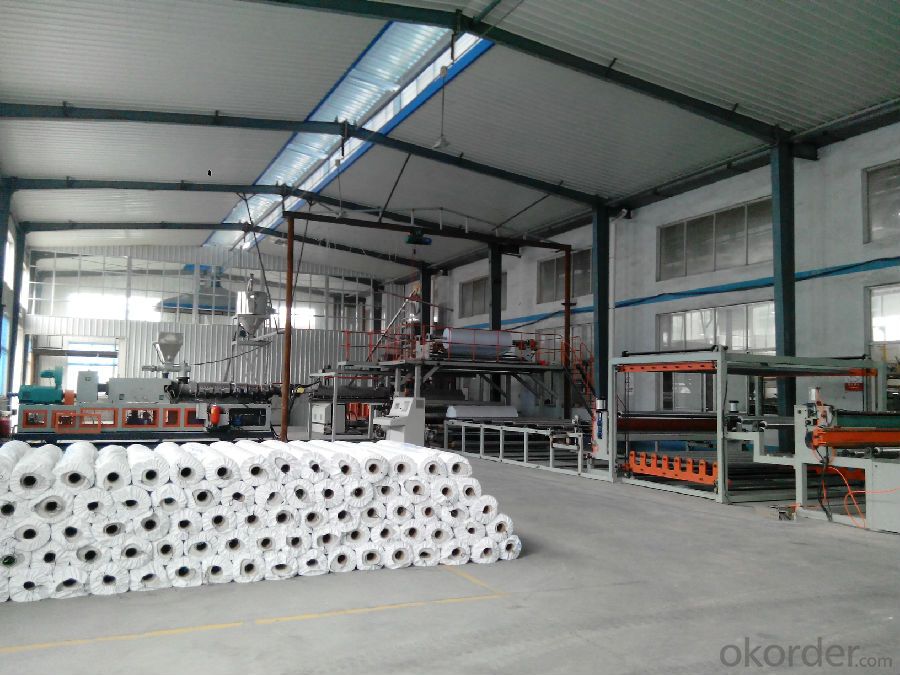
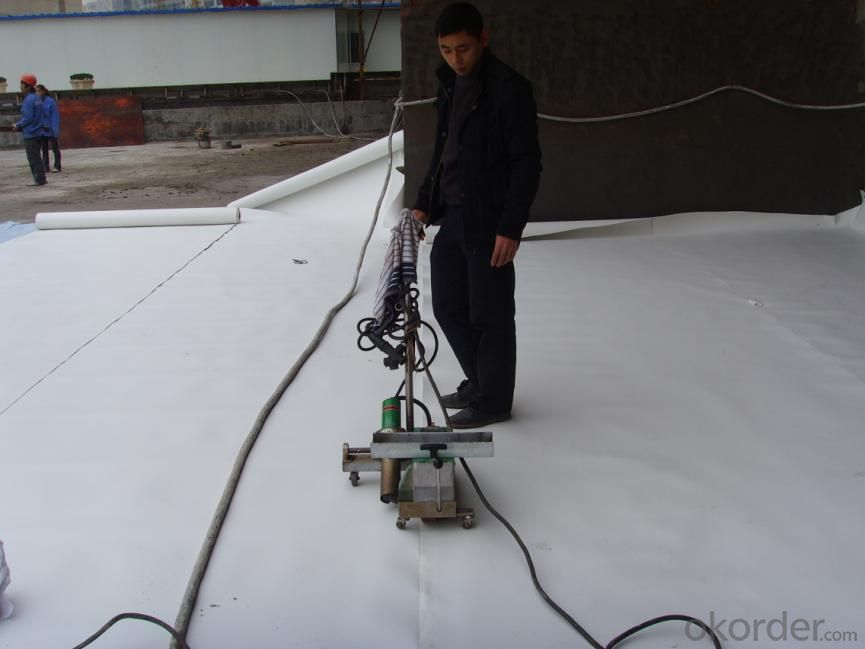
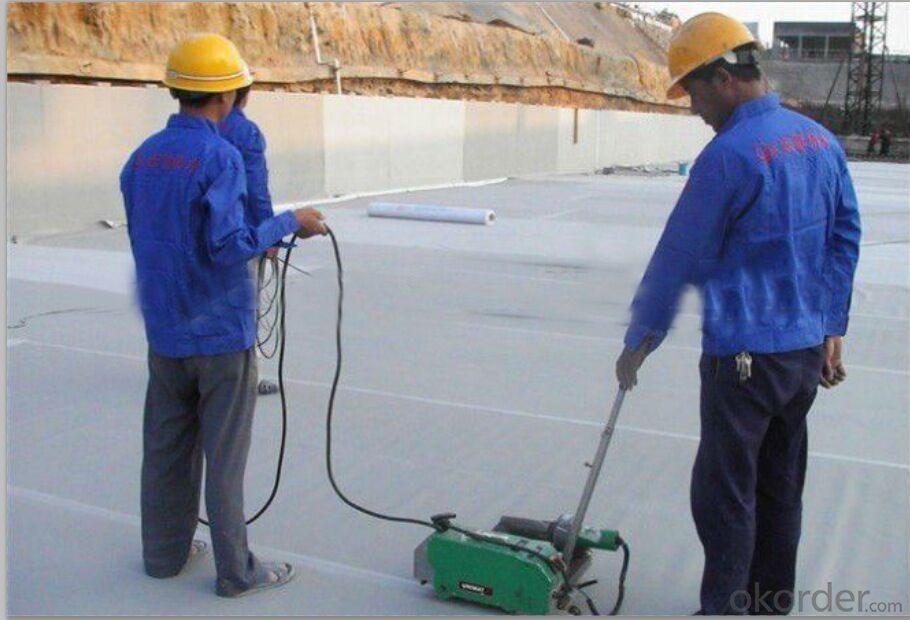
- Q:Can a waterproofing membrane be used in chemical or hazardous environments?
- Yes, a waterproofing membrane can be used in chemical or hazardous environments. Waterproofing membranes are designed to provide a barrier against water, moisture, and other liquids, which can also include chemicals and hazardous substances. These membranes are typically made of materials that are resistant to chemicals, such as polyurethane, PVC, or modified bitumen, to ensure they can withstand exposure to various chemicals without being damaged or compromised. However, it is important to select a waterproofing membrane specifically designed for chemical or hazardous environments to ensure it meets the necessary requirements and standards for such applications. Additionally, proper installation and maintenance are crucial to ensure the effectiveness and longevity of the waterproofing membrane in these environments.
- Q:Can a waterproofing membrane be used for a parking lot pavement?
- Yes, a waterproofing membrane can be used for a parking lot pavement. Waterproofing membranes are designed to protect surfaces from water infiltration and can be applied to various surfaces, including parking lot pavements. This can help prevent water damage, increase the lifespan of the pavement, and reduce the need for costly repairs.
- Q:The difference between high polymer modified asphalt waterproofing membrane and sbs
- High-polymer modified asphalt waterproofing membrane: synthetic polymer modified asphalt coating layer, fiber fabric or fiber mat for the carcass, powder, granular, sheet or film material made of cladding material can be curled Of the sheet material. Thickness is generally 3mm, 4mm, 5mm, asphalt as the main body.
- Q:Can a waterproofing membrane be used in tunnels or underground structures?
- Yes, a waterproofing membrane can be used in tunnels or underground structures. Waterproofing membranes are designed to create a barrier against water penetration, making them effective in preventing water ingress in underground environments. These membranes are commonly used in tunnel construction to protect against moisture and water-related damages.
- Q:Can a waterproofing membrane be used for power plants?
- Yes, a waterproofing membrane can be used for power plants. Waterproofing membranes are commonly used in various applications where water penetration needs to be prevented, and power plants are no exception. Power plants often have areas that are exposed to water, such as cooling towers, wet flue gas desulfurization systems, and other water management systems. Using a waterproofing membrane in these areas can help protect the structures and equipment from water damage, corrosion, and leaks. Additionally, waterproofing membranes can also be used in underground structures, such as basements or tunnels, which are commonly found in power plants. These membranes provide an effective barrier against water infiltration, ensuring the integrity and longevity of the structures in power plants. Therefore, utilizing a waterproofing membrane is a practical and beneficial solution for maintaining the performance and reliability of power plant facilities.
- Q:Can a waterproofing membrane be used for zoos or aquariums?
- Zoos or aquariums can definitely utilize waterproofing membranes. These membranes are specifically designed to create a protective barrier against water infiltration, making them an excellent choice for preventing water damage and leakage in such environments. They can be applied to different surfaces, such as concrete or steel, to establish a watertight seal and prevent water from seeping into the structure or habitat. Aquariums often rely on waterproofing membranes to ensure that their tanks remain completely watertight and free from leaks, as this is crucial for the well-being of the aquatic animals. Similarly, in zoos, waterproofing membranes can be applied to animal enclosures or exhibit areas to safeguard the structures from water damage and uphold a safe and healthy environment for the animals. Moreover, these membranes possess resistance against various chemicals and can withstand harsh conditions, making them an excellent safeguard against potential chemical spills. All in all, waterproofing membranes are a highly suitable option for zoos or aquariums, as they offer an effective solution for preserving the integrity of the structures and habitats, averting water damage, and ensuring the safety and well-being of the animals.
- Q:Can a waterproofing membrane be used for swimming pool decks or patios?
- Certainly, swimming pool decks or patios can absolutely benefit from the utilization of a waterproofing membrane. These specialized membranes are specifically engineered to establish a protective barrier that prevents water infiltration, thus averting potential harm to the surface. Various surfaces, including concrete, wood, and stone, can be effectively waterproofed by employing these membranes. By applying a waterproofing membrane to swimming pool decks or patios, the underlying structure can be shielded against water-induced damage, such as cracks, mold, and wear. Furthermore, these membranes also offer slip resistance, which is a crucial safety feature for areas surrounding swimming pools. Overall, the application of a waterproofing membrane is a reliable and efficient approach to safeguarding and extending the lifespan of swimming pool decks and patios.
- Q:Are waterproofing membranes resistant to gasoline?
- Waterproofing membranes, in general, display resistance towards gasoline. These membranes are chemically resistant and capable of enduring exposure to diverse chemicals, which includes gasoline. Nevertheless, it is crucial to acknowledge that the extent of resistance may differ depending on the particular membrane type and its composition. Certain membranes may provide superior resistance to gasoline compared to others. Furthermore, extended exposure to gasoline can potentially harm or deteriorate the membrane over time, hence it is always advised to take essential precautions and avoid prolonged contact with harsh chemicals.
- Q:Can a waterproofing membrane be used on balconies and decks?
- Yes, a waterproofing membrane can be used on balconies and decks. In fact, it is highly recommended to install a waterproofing membrane to protect these areas from water damage. Balconies and decks are exposed to rain, snow, and other weather elements, which can cause water to seep into the structure and lead to issues such as rotting, mold growth, and structural damage. A waterproofing membrane provides a protective barrier that prevents water from penetrating the surface and directs it away from the structure. It is typically applied underneath the surface material, such as tiles or decking, and acts as a waterproof layer. This helps to extend the lifespan of the balcony or deck, ensuring its durability and maintaining its aesthetic appeal. Additionally, using a waterproofing membrane can also prevent water from dripping down to the areas below, which is particularly important for balconies located above living spaces. Overall, using a waterproofing membrane is an effective solution to ensure the longevity and functionality of balconies and decks.
- Q:Are waterproofing membranes resistant to chlorine exposure?
- Waterproofing membranes can vary in their resistance to chlorine exposure. Some membranes are specifically designed to be resistant to chlorine and are commonly used in applications where chlorine exposure is expected, such as pool decks or water treatment facilities. These membranes are typically made with materials like PVC or TPO that have inherent resistance to chlorine and can withstand prolonged exposure without significant degradation. However, it is important to note that not all waterproofing membranes are chlorine-resistant. Some membranes, particularly those made with materials like EPDM or bitumen, may not be as resistant to chlorine and may experience deterioration or damage when exposed to chlorine for extended periods. To ensure the longevity and effectiveness of a waterproofing membrane in a chlorine-rich environment, it is crucial to select a membrane that is specifically designed and tested for chlorine resistance. Consulting with a waterproofing professional or manufacturer can help determine the most suitable membrane for the specific chlorine exposure conditions.
1. Manufacturer Overview |
|
|---|---|
| Location | |
| Year Established | |
| Annual Output Value | |
| Main Markets | |
| Company Certifications | |
2. Manufacturer Certificates |
|
|---|---|
| a) Certification Name | |
| Range | |
| Reference | |
| Validity Period | |
3. Manufacturer Capability |
|
|---|---|
| a)Trade Capacity | |
| Nearest Port | |
| Export Percentage | |
| No.of Employees in Trade Department | |
| Language Spoken: | |
| b)Factory Information | |
| Factory Size: | |
| No. of Production Lines | |
| Contract Manufacturing | |
| Product Price Range | |
Send your message to us
SBS Modified Waterproof Membrance
- Loading Port:
- Tianjin
- Payment Terms:
- TT or LC
- Min Order Qty:
- 10000 m²
- Supply Capability:
- 15000000 m²/month
OKorder Service Pledge
OKorder Financial Service
Similar products
New products
Hot products
Hot Searches
Related keywords
